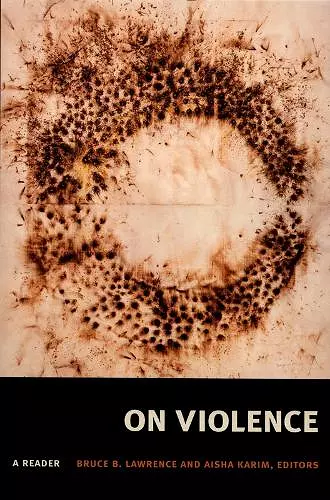On Violence
A Reader
Bruce B Lawrence editor Aisha Karim editor
Format:Hardback
Publisher:Duke University Press
Published:6th Dec '07
Currently unavailable, and unfortunately no date known when it will be back

Primary texts on violence, from Freud to Gramsci to Foucault, from Ghandi to Osama bin Laden.
This anthology brings together classic perspectives on violence, putting into productive conversation the thought of well-known theorists and activists, including Hannah Arendt, Karl Marx, G. W. F. Hegel, Osama bin Laden, Sigmund Freud, Frantz Fanon, Thomas Hobbes, and Pierre Bourdieu. The volume proceeds from the editors’ contention that violence is always historically contingent; it must be contextualized to be understood. They argue that violence is a process rather than a discrete product. It is intrinsic to the human condition, an inescapable fact of life that can be channeled and reckoned with but never completely suppressed. Above all, they seek to illuminate the relationship between action and knowledge about violence, and to examine how one might speak about violence without replicating or perpetuating it.
On Violence is divided into five sections. Underscoring the connection between violence and economic world orders, the first section explores the dialectical relationship between domination and subordination. The second section brings together pieces by political actors who spoke about the tension between violence and nonviolence—Gandhi, Hitler, and Malcolm X—and by critics who have commented on that tension. The third grouping examines institutional faces of violence—familial, legal, and religious—while the fourth reflects on state violence. With a focus on issues of representation, the final section includes pieces on the relationship between violence and art, stories, and the media. The editors’ introduction to each section highlights the significant theoretical points raised and the interconnections between the essays. Brief introductions to individual selections provide information about the authors and their particular contributions to theories of violence.
With selections by: Hannah Arendt, Walter Benjamin, Osama bin Laden, Pierre Bourdieu, André Breton, James Cone, Robert M. Cover, Gilles Deleuze, Friedrich Engels, Frantz Fanon, Michel Foucault, Sigmund Freud, Mohandas Gandhi, René Girard, Linda Gordon, Antonio Gramsci, Félix Guattari, G. W. F. Hegel, Adolf Hitler, Thomas Hobbes, Bruce B. Lawrence, Elliott Leyton, Catharine MacKinnon, Malcolm X, Dorothy Martin, Karl Marx, Chandra Muzaffar, James C. Scott, Kristine Stiles, Michael Taussig, Leon Trotsky, Simone Weil, Sharon Welch, Raymond Williams
“This volume provides a long-needed anthology of major writings related to the subject of violence. The readings include excerpts from classic contributions of Marx and Freud along with pieces by modern thinkers such as Girard and Bourdieu and social activists from Gandhi to bin Laden. The selections are skillfully chosen to address a central theme, that violence always takes place in a context. The readings explore the idea that social, internal, ritualized, and other forms of violence are part of the processes of life and not necessarily anomalies. This is a thoughtful and arresting set of essays on an important topic that will be useful in the classroom and much discussed in the public forum.”—Mark Juergensmeyer, University of California, Santa Barbara, author of Terror in the Mind of God: The Global Rise of Religious Violence
“[T]his anthology is a triumph of editorial serendipity.” -- Steven Poole * The Guardian *
“Even though its tone is unremittingly gloomy, reading through On Violence reveals an impressive selection of thinkers about this vexed subject. The brilliance of this collection lies in the editors’ courage to include unpalatable writings alongside noble ones.” -- Tim Roberts * M/C Reviews *
“Offering an eclectic roster of voices on the subject, this useful reader also raises the suspicion that the history of violence is a red herring. The pervasiveness of violence makes it difficult to distinguish violence from change, or history itself. Violent change requires some kind of ethical marker to make narrative sense as history. Violence is never morally or politically neutral: context is everything.” -- Priya Satia * TLS *
ISBN: 9780822337560
Dimensions: unknown
Weight: 953g
592 pages